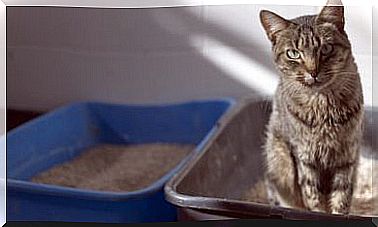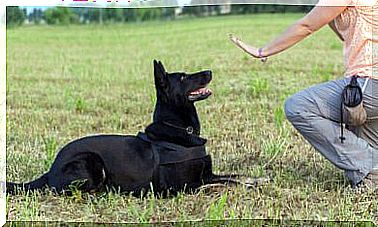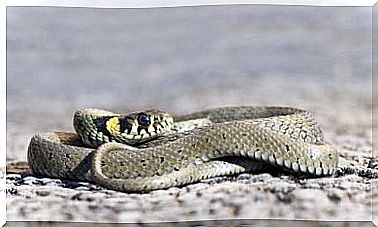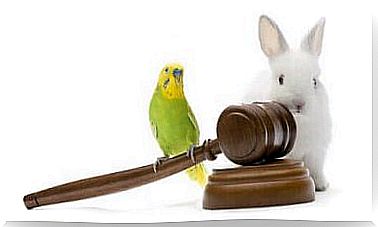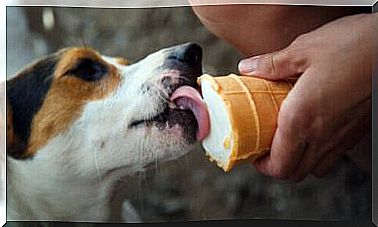5 Possible Causes Of Bad Breath In Dogs
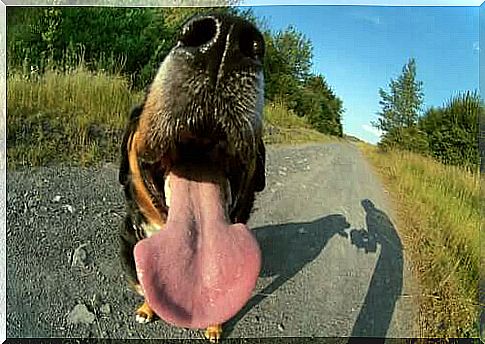
Many animal carers consider bad breath in dogs to be completely natural. In other words, they think it’s normal for her mouth to smell bad. There is nothing so far from reality.
We certainly can’t expect the dog to have menthol breath, but this should still be neutral. If a dog has bad breath, there is an underlying problem that is causing it.
Most of the conditions that cause halitosis in dogs are dangerous and can lead to a slow deterioration of the animal’s health, to the point that, by the time other symptoms appear, it may be too late for treatment.
If your dog’s mouth smells bad, see a professional for a dental examination. It is critically important to find out what causes bad breath in dogs.
Accumulation of tartar and bad breath in dogs
Tartar is made up of bacterial plaque that remains attached to the tooth due to the deposit of minerals. In addition to causing severe halitosis in the event that the accumulation of tartar is important, it is also possible that adjacent tissues, such as the gums, are damaged.
This phenomenon causes gingivitis and the onset of subsequent infections that will increase the bad smell of the dog’s mouth.
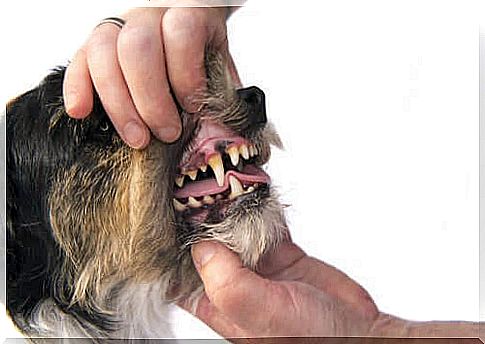
On the other hand, due to its mineral nature, tartar can damage other organs, such as the heart, kidneys or lungs. In this way, it can cause heart disease, kidney stones, etc.
Oral neoplasms
Oral neoplasms are relatively common in dogs, in which they present in a benign form, unlike cats that develop malignant tumors more frequently.
These tumors can appear anywhere in the mouth, such as the lips, hard or soft palate, gums … Occasionally, a malignant carcinoma develops.
Depending on the nature of the tumor, the dog will suffer from mild discomfort or severe stomatitis (inflammation of the oral mucosa) accompanied by halitosis. Likewise, due to the pain, he may stop eating and suffer from anorexia.
Oral infections for Candida albicans
Candidiasis is a fungal disease (caused by fungi) that affects mammals, including humans, and birds. This disease is caused, specifically, by the yeast Candida albicans.
When it infects a dog’s mouth, it can cause several symptoms, such as:
- Anorexia or lack of appetite
- Difficulty in swallowing
- Excess of salivation
- Halitosis
- Gingivitis

Being a fungal disease, it involves a very specific treatment, which must always be prescribed by a veterinarian. In addition, specific tests are required to determine that this is the fungus that has infected the dog’s mouth.
Periodontal disease
One of the most serious and common diseases that can affect the mouth and cause bad breath in dogs is periodontal disease.
This pathology begins with an accumulation of tartar on the teeth which leads to the onset of gingivitis or inflammation of the gums. This stage of the disease is completely reversible with proper treatment and therapy.
However, periodontitis appears shortly after. At this stage, the dog will have severe pain and widespread infections inside the mouth. For this reason, he may stop eating. It will begin to lose tissue from the gums and, consequently, the teeth, which may not fall out because they are supported by the deposited tartar.
Chronic kidney disease and bad breath in dogs
Chronic kidney disease is defined as the presence of functional or structural abnormalities in one or both kidneys that persist for at least three or more months. This serious pathology, which compromises the life of the animal, is accompanied by several symptoms:
- Halitosis
- Weight loss
- Polyuria-polydipsia
- Urinary incontinence
- He retched
- Decreased appetite
- Numbness
- Diarrhea
On the other hand, dogs suffering from this disease generally develop heart problems as well. In many cases, these problems result from poor oral hygiene. Consequently, it is of paramount importance to take care of our dogs mouth.
